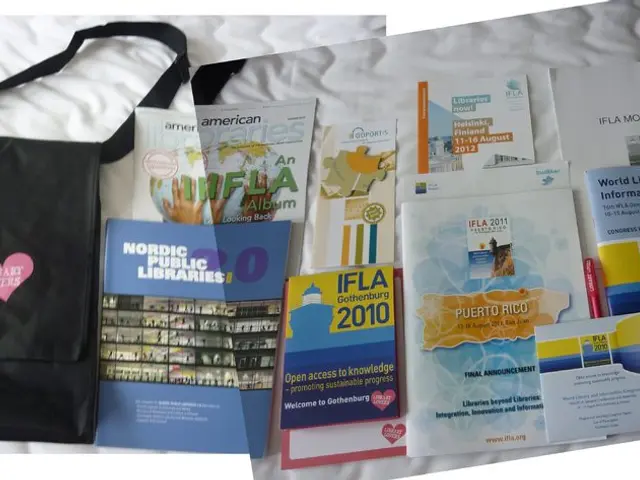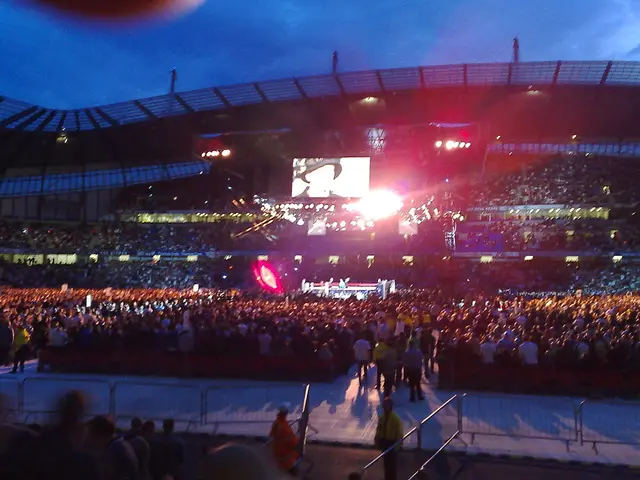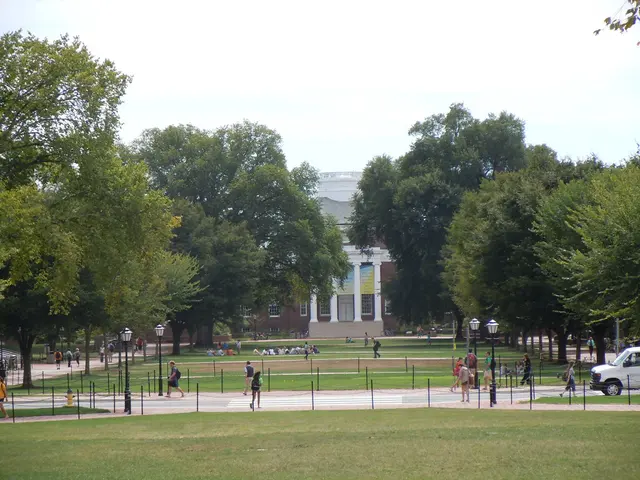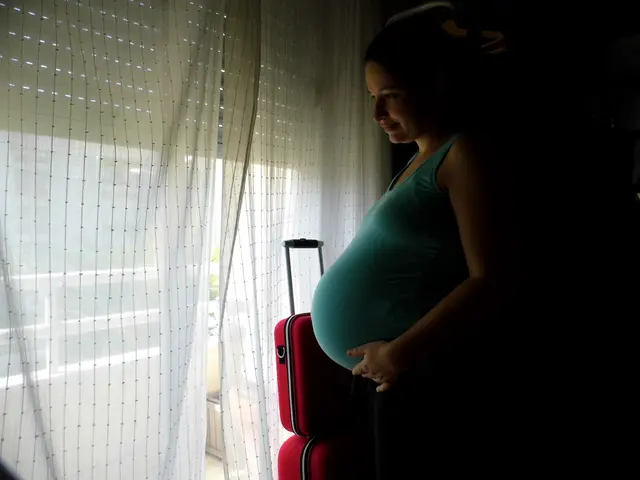Romania's Irina Papuc Achieves Rare Journey to Mythical Lake Tele on Expedition in Congo
Headline: Romanian Adventurer Irina Papuc Unearths the Hidden Secrets of Congo's Mystical Lake Tele
After a whirlwind, spur-of-the-moment decision, Romanian explorer Irina Papuc set off on an unforgettable expedition to the remote and unexplored Lake Tele in the Republic of Congo. This untouched, isolated body of water is shrouded in legends, boasting whispers of a mythical dinosaur-like creature known as Mokele-Mbembe.
Born in Sibiu, Romania, and raised in Chicago by her artistic grandparents, Papuc grew up with a penchant for life's intangible riches. Her journey from a physics degree at the Illinois Institute of Technology to co-founding the award-winning digital marketing agency, Galactic Fed, reflects her insatiable appetite for adventure and a need for freedom of movement.
As she recounts her expedition, it becomes clear that Lake Tele is no ordinary destination. Encountering dangerous wildlife, conquering perilous treks, and navigating uncharted waters, Papuc and her travel companion, business partner Zach Boyette, embarked on an adventure that defied the ordinary.
"I regard travel as a slow, overland pilgrimage, where you show up on the world's doorstep and are sometimes invited in for a glimpse into how other people eat, cook, and live," Papuc shares with us.
Papuc and Boyette ventured through the unpredictable currents of the Congo River, weathered dense jungles, and braved the eerie silence of one of the world's most remote places. From quicksand and deadly centipedes to "tons and tons of Gorillas," "dudes with guns and spears," and local taboos, every step of the journey was a once-in-a-lifetime adventure.
As they ventured closer to Lake Tele, Papuc and Boyette garnered the trust of the local tribes, who guard the lake as a sacred site. To earn their blessing, the explorers followed various spiritual rules of conduct, including feigning astonishment upon seeing the lake and refraining from carrying religious relics.
With the Chief's blessing, Papuc and Boyette explored the lake and uncovered more about the Mokele-Mbembe legend. While the lake is considered sacred, inhabited by a creature said to resemble a dinosaur, neither Papuc nor Boyette reported any encounters.
Despite the isolated and challenging nature of Lake Tele, Papuc found the local communities to be incredibly warm and welcoming. During their travels, they encountered people willing to share their homes and stories, even when they themselves had little to give.
Lake Tele left a lasting impression on Papuc, and she hopes to return to explore more of the surrounding area and delve deeper into the mysteries of the Mokele-Mbembe legend. A true adventurer at heart, she's alreadyset her sights on Vanuatu and the islands of the Pacific, as well as remote tribal communities in Indonesia and the hard-to-reach spots of Kiribati.
Papuc's journey to Lake Tele showcases her unwavering spirit and her determination to uncover the world's hidden wonders. As she continues to explore the globe, her tales of adventure will no doubt inspire others to embark on their own unforgettable journeys.
Interview Questions:
- Can you tell us a bit about yourself - where you're from, where you're based now, your journey from Romania to the US, and a brief overview of your career?Answer: I'm originally from Sibiu, Romania, and immigrated to the United States in 1990 when I was two years old. I grew up in Chicago with my grandparents, who are Romanian artists. We were poor, but I felt rich in spirit because they taught me to value the spiritual part of life. I watched them struggle and sacrifice a lot for the promise of a better life for the family, and this motivated me to try very hard at life myself. I was fortunate to gain a scholarship at a local tech college (IIT), where I graduated with a degree in physics. I briefly worked at CERN (the Large Hadron Collider) as an undergrad but quickly realized that office life was not for me. What I really wanted was complete freedom of movement. I ended up buying a one-way ticket to Taiwan shortly after graduating and taught English there for a year before embarking on a 9-month journey, mostly overland, from Thailand to Romania. During these 9 months, I spent only about USD 2,000 before I camped, hitch-hiked, and eventually slept in the back of a station wagon my friend and I bought in Bishkek, Kyrgyzstan. Met many wonderful local people along the way who took me into their homes and made me feel like a part of their family. I returned to the US in 2014, where I applied for one single job, an entry-level position at unicorn tech startup Toptal, which I was lucky enough to get, and eventually led their SEO program for 3 years. Left Toptal in 2018 to start the award-winning digital marketing agency Galactic Fed.
- What inspired you to embark on such an adventurous journey to Lake Tele in the Republic of Congo?Answer: It was a spontaneous decision, really! My co-founder Zach and I knew vaguely that we wanted to travel through Africa for three months, but we had no solid plan to begin with. At the last minute, after a month in Kenya and Tanzania, I suggested we go to the Congo, mostly because of my love for Joseph Conrad's "The Heart of Darkness," and that's how we ended up flying there!
- As the first documented Romanian citizen to reach Lac Tele, can you describe your experience of visiting the lake and the challenges you faced along the way? How did you prepare for such an isolated and difficult expedition, especially considering its remote location and sacred status to the local tribe?Answer: My co-founder and best friend Zach Boyette went on the entire journey with me and is the first documented person from the SE United States to reach the Lake. We journeyed over 5,000 kilometers up the Congo River on a long, slowly sinking motorized pirogue (Congolese narrow boat), loaded up with everything we needed for the next month to survive, including fuel, water, tins of fish and pasta, and endless chocolate bars. We left at night, a dangerous time when hippos and crocodiles are most active and difficult to spot. Our boatsman kept flashing his lantern at the choppy, mosquito-infested waters in case a holographic eye could be seen looking back. We had no idea what to expect and little time to prepare. Zach and I went to the giant bazaar in the center of Brazzaville and loaded up on baby wipes! And we also purchased some second-hand clothes, refurbished surgeon scrubs, that I wore for the rest of the journey. We survived a dozen African wild bee stings, a joust with a deadly, 7" long centipede, a lorry truck that nearly fell off a cliff which was packed with over 40 people and would have crushed us to death if it moved one more centimeter the wrong way. We also experienced close encounters with a leopard and a gorilla, dudes with guns and spears, passing through Ebola zones, nearly capsizing in a malarial swamp, story-telling of a semi-mythological dinosaur, and zooming along the Congo River on a steadily sinking dugout canoe. After periods of boat travel down the Congo River and a few truly terrifying moments on the lorry truck that nearly fell into a swamp, we reached the final portion, the village where the last tribe near the lake lived. Here, we gave them money and cases of the local wine, the Baron de Madrid, and the Chief blessed and allowed our journey. Because the lake is sacred to the tribe, there are many taboos associated with it. For example, we cannot bring any religious relics to the lake. The tribesmen who accompanied us to the lake loved to tell us a story of a poor Japanese guy who had mistakenly brought a cross with him to the lake, only to mysteriously die right after reaching home. In the final stretch, the jungle around the lake, a place that contains the largest population of overland gorillas in the world (about 130,000), we basically ran through thick jungle for 10-12 hours a day, sometimes for hours in the pouring rain, because we were there during the rainy season. I tripped about 50 times an hour and fell on my face several times. My legs were covered in cuts and bruises from the countless times I slipped on the wet, vine-covered forest floor or plummetted through 4-5 feet holes covered in deceptive detritus. During a rest stop, I wandered to the river's shore and began to sink into quicksand while the Congolese tried to take my picture. It was the rainy season in the Congo River basin, and it poured for hours nearly every afternoon, so we marched entirely drenched, smoking our clothes and shoes over a fire in the evening. Along with our friendly tribesmen who accompanied us on the journey, we sang songs and chants in Lingala, drank whiskey, and caroused well into the night with our forest brothers, a group of 10 men who accompanied us from the village and who lovingly called me Guactelle (mother).
- How long was your stay there, and what were the most exciting things you discovered - in terms of wildlife, ecosystem, or local culture? Were there any surprises?Answer: To summarize, Zach and I were out there about 3-4 weeks, and we discovered: - Wild African bees - each of us was stung at least a dozen times! - Tons and tons of Gorillas - the Congo basin is the area with the largest population of overland gorillas in the world (at around 130K). - Quicksand - nearly ended up swallowed up by it several times! - Deadly centipedes. - The local tribespeople who accompanied us to the lake thought that the white noise machine that Zach sleeps with every night was a black magic fetish object, and we had to show them that it was a speaker, then use it to play dance music around the campfire and sing together, thus dispelling all doubts! - Our cook, DMX (not his real name), got malaria on the journey and just brushed it off as if it was a bad cold! - There were French baguettes for sale almost everywhere, sometimes right next to the machetes! (complete with free ants!) - The Congolese were incredibly warm, and many times on the Congo River, we had to stop because of the rain, and tribes unknown to us or our team were taking us in and giving us a place to stay. - I met a chief somewhere on the journey who spoke fluent Romanian! He had studied agricultural engineering in Cluj in the 70s, and on his walls were portraits of his trips to North Korea. - Another surprising thing I learned while on the Congo River is that GPS will not help you navigate. Instead, our Congolese crew would periodically ask tribal people along the shores if we were heading in the right direction, and it was easy to get lost because the river split into many small tributaries at times, but the human-powered GPS did not fail us.
- Can you tell us more about the Mkolo Mbembe legend and its importance to the local community?Answer: Regarding the Mokele-Mbembe, some of this may have been lost in translation, as our guide was not fluent in the local tribal language, but to the best of my knowledge, I understand that the locals believed that until recently, there were two mokele-mbembes left, and they lived at the bottom of the Lake. One had recently died, and now only one was left. Despite their belief in this creature residing in the black, very organic waters of the lake (it felt like swimming in a giant cup of tea, the water was rich with centuries of decaying tree and plant matter), neither the forest people nor Zach and I had had any qualms with swimming in its waters. As soon as we reached its shores, we went into the lake to wash off weeks' worth of sweat. The lake is sacred to the tribe, and young boys undertake a rite of passage by doing the same journey we did to the lake. Among the many taboos we had to follow (most of which we never learned, again, because it was difficult to communicate with the forest tribe): - You had to feign excitement when you reached the lake - Women could not be menstruating near the lake - You could not carry any religious objects with you- - Maintain a respectful attitude toward the lake
- Irina Papuc, a renowned Romanian adventurer, plans to delve deeper into the mysteries of the Mokele-Mbembe legend by exploring the surrounding areas of Lake Tele, as part of her budget-travel lifestyle that encourages unconventional, adventure-travel.
- During her expedition to Lake Tele, Irina Papuc experienced a cultural-travel adventure that led her to uncover the intricate traditions and warm hospitality of local communities, proving that travel is about more than just destinations, but also the people and experiences encountered along the way.








